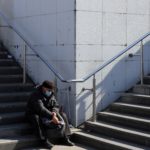 A new study from the University of Technology Sydney (UTS) reveals that homeless people frequently endure intrusive and intimidating encounters with the police, leaving them feeling harassed and stigmatized. The research highlights a troubling reality: while homelessness continues to rise—up 5.2% in Australia between 2016 and 2021—those living on the streets are often subjected to constant policing rather than support.
A new study from the University of Technology Sydney (UTS) reveals that homeless people frequently endure intrusive and intimidating encounters with the police, leaving them feeling harassed and stigmatized. The research highlights a troubling reality: while homelessness continues to rise—up 5.2% in Australia between 2016 and 2021—those living on the streets are often subjected to constant policing rather than support.
The research team spoke to over 160 homeless individuals from every Australian capital city and two regional centers, aiming to hear directly from those who are usually ignored by the system. While much attention is given to the perspectives of support agencies, courts, and lawyers, the voices of the homeless themselves are rarely heard.
Leave us alone
What they found was not a demand for better policing, but a desire for less intrusion. As one interviewee put it: “Just leave us alone. We’re just trying to find somewhere warm to sleep.” Access to housing was, of course, also a top priority.
The study participants described a relentless cycle of police surveillance, identification checks, questioning, fines, and arrests. Many felt they were being punished simply for being homeless and living on the streets. Welfare checks, even casual questions like “how are you going?” were often seen as unwelcome intrusions rather than acts of care.
First Nations people face particularly severe impacts. They experience homelessness at rates six times higher than the general population and report more frequent encounters with police violence. Some described physical abuse, such as a woman having her fingers broken while in police custody, and many expressed fear of dying in custody, underscoring the deep trauma these interactions cause.
A source of stress
For many, the pervasive presence of police is a source of stress and anxiety, heightening feelings of exclusion and marginalization. One participant, experiencing a mental health crisis, described how police intervention only worsened their distress: “It would’ve been better if they just left me alone.”
Homeless individuals often felt they were easy targets for the police, frequently singled out for minor offenses. This constant scrutiny often leads to fines and criminal records, making it even harder for them to escape the cycle of homelessness. Once burdened with a criminal record, securing housing becomes even more difficult, trapping them in a vicious cycle of poverty and criminalization.
The study also sheds light on the glaring disparity between government spending on prisons and social housing. In 2021-22, Australia spent $6 billion on prisons, far exceeding investments in social housing. The researchers argue that redirecting resources towards addressing the root causes of homelessness—such as providing adequate housing and social support—would be more effective than criminalizing those who are already vulnerable.
As one participant summed up, “The answer is not more policing, or better policing, but freedom from policing.” The study emphasizes the urgent need for stronger social safety nets, more community support services, and better public housing infrastructure to break the cycle of homelessness and criminalization.